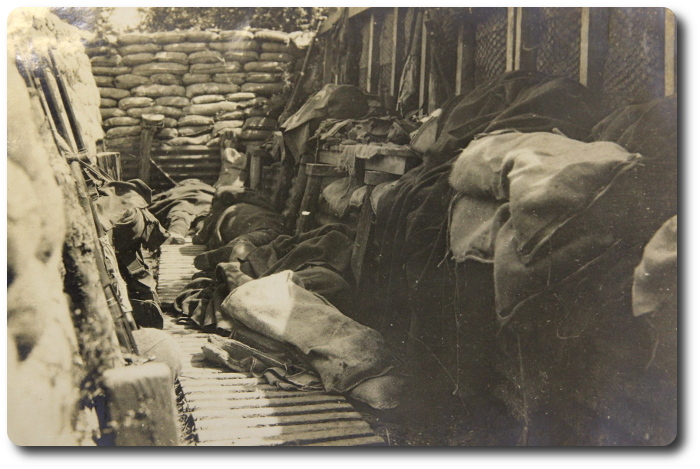Topic: CEF

Trench Warfare
Soldier Writes That Sometimes Months Pass Without Seeing Enemy
The Pittsburgh Gazette Times, 17 September 1916
In this trench warfare perhaps months pass without our men seeing one of the enemy. Their artillery bombards our trenches daily (we call it our ration) and rifles' and machine guns' fire goes on in a desultory fashion; every day brings its quota of casualties, and the communiques say that "everything is quiet on the western front."
That sounds most uninteresting. It simply means that no big action has taken place, but for those who are there it has been lively enough, with the constant toll of digging and repairing trenches, the carrying up of stores and rations, etc., all under enemy fire, writes William J. Adie in National Magazine. In these "quiet" times all the work is done under cover of darkness. During the day, if you could overlook the opposing lines of trenches, you would see not a sign of life—all you would see would be a few lines of earth all jumbled up and nothing would suggest war or danger to you. For everyone is underground, and no living thing could move above ground safely.
On approaching the trenches, sometimes when still over a mile away, you enter a communications trench which twists its way up to the front, passing through lines after line of support trenches until you reach the front trench, which may be only 30 yards from the enemy. Here you may move about freely unseen and perfectly safe, except when the enemy sends over his shells and rifle grenades and trench mortar bombs and other unpleasant things, in hope of hitting someone by chance.

To get under ground in this way means much labor. Someone with a fondness for figures has calculated that, considering that each side has about five lines of trenches stretching from Switzerland to the sea, that the trenches are of a certain width and depth, etc., more earth has been moved by soldiers with pick and shovel than was moved to make the Panama Canal.
And it is not as if trenches once made were permanent; shell and frost and rain combine to destroy them, and the labor of keeping them in repair never ceases. The fight against water and mud is another that never ceases. Neglect a trench for 24 hours, and in this awful land of Flanders you are up to your waist in water, so that draining and pumping work goes on all the time.
I have said that in the daytime no one moves above ground, but as soon as night falls the whole countryside swarms with men. Rations must be carried up and stores and ammunition.

All relief of troops are done at night, and at night the severely wounded are brought down, for the trenches are too narrow for a stretcher, so that the night time is my busiest time, as well as everybody else's. It is a weird business, stumbling about in the dark without lights, with odd shells and stray bullets constantly reminding you of the danger which is ever-present.
It is interesting to see th careless way in which all ranks go about their work without, you would think, any thought of the enemy or his bullets. A few months out here has one of two effects' either a man's nerves go to pieces and he is sent home for a rest, or he settles down to the work and takes everything as it comes without turning a hair.
On the whole, this regiment has been fortunate in keeping out of bad places, although we have been in some fairly big actions, and have experienced most of the horrors of war, including poison gas. At present we are well protected against gas and no one fears it, although it is very likely that the Germans will use it again.


